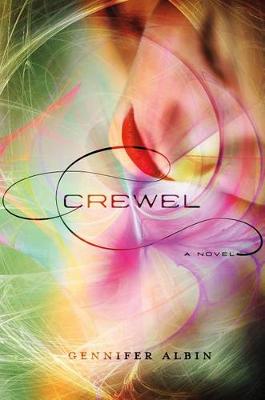Reviewed by Angie on
Crewel is a highly unique addition to the YA Sci-Fi genre. It's some strange combination of Utopia and Dystopia. I know that sounds weird, but it's true. On the surface Arras looks like a nice place to live. There's no crime, just peace, but this is actually accomplished through weaving time and matter, done by Spinsters. Adelice is 16 years old and has just been recruited as a Spinster despite her's and her family's attempts at hiding her gift. She doesn't want to be responsible for every single aspect of people's lives, including removing those who deviate from the tapestry of life.
One thing that really bothered me about Crewel was all of the talk about gowns and cosmetics. The Spinsters live a very glamorous lifestyle, but why? Their clothes and makeup didn't add anything to the story except a bunch of empty words. I much rather would have been reading more about their job and the compound. They can manipulate space and time, so who cares what they're wearing?! Even Adelice doesn't care very much about the glitz and glamor, so why does the author spend so much time talking about it? It just became irritating about a third of the way in.
The world, Arras, was what I really wanted to learn more about. It's an extremely fascinating concept to have a world where everything can be altered at a simple touch. But it's not very clear how it all works, and even the character don't know. There's plenty of "we're still working things out," and "it wasn't explained" or "that has now been forgotten" and other phrases to kind of push the world building aside. I want to know how this all works! If the Spinsters must weave everything pertaining to life, who weaves the Spinsters? Why the looms? Why do some girls have the gift and others don't? If women ultimately have all of the control, why are they run by men?! Some answers start popping up in the last third, but they also sparked more questions about this complex and compelling world!
As for the plot...I was less interested, but there wasn't much of a plot to start out with anyway. The first two thirds are essentially just Adelice being "tested" by a jealous head Spinster and basically being told to "shut up and look pretty" by everyone who knows about her special talent. Of course, there's also the love triangle, but we never really get any real scenes of the boys and Adelice doing anything lovey related until a random kiss with one of them. It's more implied though, since she's never been around boys before and now all of a sudden there's two set to guard her and cater to her.
We also don't even get to know Erik that well at all, so it's almost like he doesn't exist until he's needed as eye-candy. I did like Jost though, but he was also the more fleshed out of the two love interests. This isn't really surprising though, since our heroine is a pretty bland character, too. In short, the world and the concept completely out shine the characters and the plot, and ultimately, it's what kept me interested, if not invested.
By the end I was getting a headache trying to figure everything out, and things started getting very weird and slightly creepy. There's some explanations about the history of Arras, but it's still confusing as heck. Plus there's all kinds of random things that start popping up seemingly out of nowhere. Overall, Crewel is an interesting read even if the plot, characters, and romance are lackluster. Will I read the next book? Most definitely! Would I recommend this one? Yes, if you're looking for something really out there and can overlook my complaints.
Read more of my reviews at Pinkindle Reads & Reviews.
Reading updates
- Started reading
- 15 November, 2012: Finished reading
- 15 November, 2012: Reviewed
